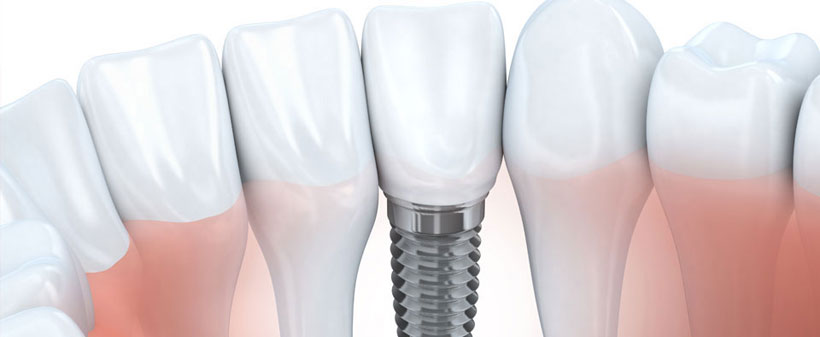Dental implants are artificial tooth roots that are inserted into the jawbone. They are allowed to be surrounded by bone tissue, so they get embedded and integrated as part of the jawbone.
Once the implants are totally entrenched, they will not move from their place and will act like real teeth roots. A crown can be placed on top of an abutment to join it with the implant.
Dental implants are expected to stay in place for a life time. But like everything else in the world, sometimes implants can fail.
The major reasons for the failure of dental implants are just the same as those that cause the loss of natural teeth – lack of proper dental hygiene. Another major reason for dental implants failing is lack of time given for the process of osseointegration and healing.
Read on to understand how to care for your dental implants so they last you a life time.
Oral hygiene
Just like a natural tooth, the dental implant requires pretty much the same oral care routine.
When the brushing and flossing regimen is not maintained, germs in the mouth take over and begin to degrade sugar and food waste.
The bacteria’s operation generates plaque and acid as by-products, which wreaks havoc on our teeth. Although the implant is made of metal, the tissues surrounding it are alive and can be attacked and influenced by the germs and acid.
The plaque accumulation around the crown will reach the root and harm the gums, which will damage the foundation on which the implant rests.
Peri-implantitis is a disease that affects the bone tissues and causes plaque build-up around dental implants. If this disease is allowed to progress, there is little chance of saving the implant.
Therefore, the most important factor in taking care of your dental implant is to follow a strict dental hygiene routine.
It is imperative to brush your teeth regularly twice a day, preferably after every meal. Flossing is very important too, as the food trapped between teeth will allow the bacteria to thrive.
Before going to bed, you must floss. Because there is no dental activity at night, germs will have plenty of opportunity to work on food debris. One of the methods for protecting implants from peri-implantitis is to maintain a healthy oral hygiene routine.
Healthy and balanced diet
Our diet has an influence on every aspect of our lives, including our teeth. It wouldn’t be an exaggeration to say that what we eat has a significant impact on our teeth. Our busy lifestyles have resulted in changes in our food habits.
Bacteria love sugar. Excessive sugar intake is not only harmful to one’s health, it is also detrimental to one’s teeth since it is impossible to brush after every meal. When we eat sugary stuff, the sugar in food tends to get stuck on the surfaces of our molars and other teeth.
Sugar remnants allow the germs to thrive, which cause cavities and bone damage in our teeth. Limiting sugar consumption is critical to safeguard your implant in place.
Smoking
If you are a smoker, then you have to learn to live without smoking after dental implant surgery.
Smoking is one of the leading causes of gum disease. Smoking also affects the implant life because it affects the blood flow to the implant site. The bone tissues supporting the implant needs oxygen which, if denied, will weaken the bone structure around the implant and it may come undone.
Teeth grinding
If you have bruxism and you grind teeth in sleep, or get occlusal trauma, it can harm the implant structure.
Grinding teeth in sleep puts pressure on the crown which will loosen. The regular pressure of teeth grinding may affect the dental implant and make it loosen from the bone tissues it is surrounded with, or it may fracture it.
With each grinding of the teeth the implant also moves, and if this is done every night it affects the life of the tissues and the implant itself.
Therefore, it is imperative that you wear a mouth guard at night to keep from teeth grinding, or visit your dentist and get a solution for bruxism.
Get treatment for diabetes
If you suffer from any lifestyle or inherited conditions like diabetes, it is very important to control the sugar level. Increased sugar levels in the blood affects the bone tissues and in turn affects the implant, making it vulnerable.
Calcium intake
With advancing age, people suffer from osteoporosis which makes the bones porous and more susceptible to break. It is important to keep monitoring this disease and get extra calcium and other minerals for it.
Immunity in old age
Many old people suffer from weakened immune system due to age. Take care of your vitamins and minerals intake to keep your implant from weakening due to any immunity failure ailment.
Take care of your heart
Conditions like high blood pressure affects the heart and many cardiovascular diseases are known to contribute to dental implant failure.
Medications
Certain medications can cause the implant to weaken and get loose from the surrounding tissue. Talk to your dentist about all the medicines you take so that he can suggest ways to counter the effects of these medicines.
Regular visit to the dentist
It is critical to see your dentist on a regular basis and talk about everything in detail, even as you continue to follow a strict oral hygiene routine at home. At least once every six months, visit your dentist. Take this seriously, especially if you have an implant.
If you notice anything unusual, contact your dentist for an appointment so that they can take a look at it. If there is a problem, a minor treatment procedure may rectify it and give a longer life to your implant.
It is always better to know what’s going on with your implant than to be in the dark. It’s an expensive investment in your happiness quotient, after all.


